Japan and the United Nations
Prime Minister Abe Attends the 72nd United Nations General Assembly
September 22, 2017
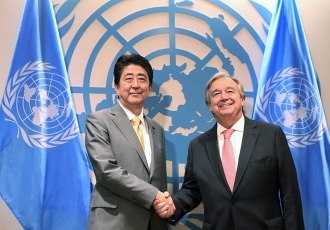 Pool Photo
Pool Photo
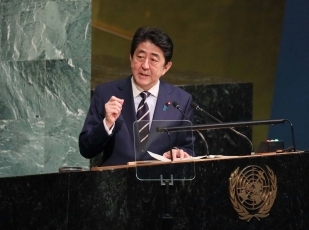 Photo: Cabinet Public Relations Office
Photo: Cabinet Public Relations Office
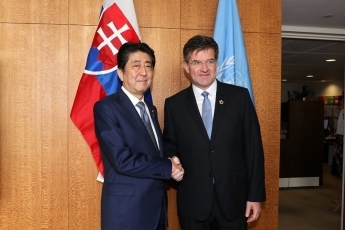 Photo: Cabinet Public Relations Office
Photo: Cabinet Public Relations Office
- Mr. Shinzo Abe, Prime Minister of Japan, visited New York from Monday, September 18 (local time) to Thursday, September 21 (local time) for the fifth consecutive year to attend the 72nd United Nations (UN) General Assembly.
- Considering fact that North Korea conducted its sixth nuclear test, and launched ballistic missiles that flew over Japan twice during the last three weeks, Prime Minister Abe used the fora such as various multilateral and bilateral meetings and an address to the UN to convey the need for the international community to work in solidarity against the threat posed by North Korea. Additionally, Prime Minister Abe emphasized the need to apply an unprecedented and new level of pressure on North Korea to urge it change its policy by fully implementing the relevant UN Security Council (UNSC) resolutions, including the new resolution.
- In his address to the UN General Assembly, Prime Minister Abe pointed out that the North Korea nuclear and missile problem constitutes an unprecedented, grave and imminent threat, and explained that North Korea must be made to abandon all its nuclear and ballistic missile programs in a complete, verifiable and irreversible manner. Prime Minister Abe stated that in order to achieve that, what is needed is pressure, not dialogue, and he called for the international community's solidarity. Prime Minister Abe also explained that he would do all possible efforts to repatriate the victims of the abductions as quickly as possible.
- Prime Minister Abe held summit meetings with Israel, Jordan, Iran, France, Turkey, Croatia, the Republic of Korea, and the United States, as well as meetings with H.E. Mr. Antonio Guterres, Secretary General of the UN, and H.E. Dr. Miroslav Lajčák, President of the 72nd session of the UN General Assembly. Prime Minister Abe also held a meeting with the leaders of African countries, and a summit meeting with Pacific island countries' leaders. Furthermore, he received a courtesy call by Mr. Thomas Bach, President of the International Olympic Committee (IOC).
- Prime Minister Abe gave a speech at a side event on promoting Universal Health Coverage (UHC), and stressed the importance of UHC and shared the contributions Japan is making. Furthermore, Prime Minister Abe has been selected as one of 10 Heads of State for promoting UN Women's HeForShe Campaign, and he gave a speech at the announcement ceremony for the HeForShe IMPACT10×10×10 Parity Report.
- Additionally, Prime Minister Abe presented a speech at the New York Stock Exchange (NYSE) in order to convey Japan's economic and fiscal policies, beginning with Abenomics, and he also conveyed Japan's appeal and called for investment in Japan by holding a food and tourism reception and an informal discussion with CEOs in the U.S. Prime Minister Abe also participated in a social gathering to encourage Japanese staff working at UN organizations.
1 Overview of results from major events
(1) Address to the UN (September 20 (Wednesday))
Prime Minister Abe delivered an address to the UN General Assembly on September 20 (Wednesday). The overview of the address is as follows.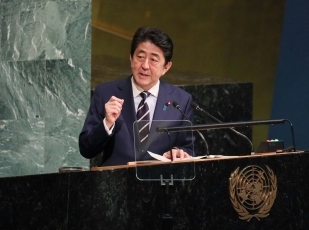 Photo: Cabinet Public Relations Office
Photo: Cabinet Public Relations Office
(a) List of things that I would have liked to raise is long, but I have no choice but to focus my remarks on North Korea
I had intended to emphasize Japan's implementation of the Sustainable Development Goals (SDGs), its support for women, UHC, the rule of law, the Paris Agreement, quality infrastructure investments, the free, liberal and open international order, preservation of multilateral frameworks and UNSC reform, and its determination to play an active role for world peace as a permanent member of the Security Council. However, I have no choice but to focus my remarks on North Korea.(b) Gravity of North Korea's nuclear and missile threat unprecedented, and indisputably a matter of urgency
North Korea conducted a nuclear test, and launched missiles that flew over Japan twice. The gravity of this threat is unprecedented. It is indisputably a matter of urgency. It represents a serious blow to disarmament efforts and the non-proliferation regime. This crisis is of an altogether different dimension to previous crises.(c) What is needed to do is not dialogue, but pressure
It was absolutely not a lack of dialogue that gave rise to this situation. Attempts to resolve issues through dialogue, such as the "Agreed Framework" between the United States and North Korea (1994) and the Joint Statement of the Six-Party Talks (2005), have all come to naught. We must make North Korea abandon all nuclear and ballistic missile programs in a complete, verifiable, and irreversible manner.(d) Determination to resolve the abductions issue
Many Japanese remain abducted in North Korea even to this day. I will continue to do all possible efforts so they can set foot on Japan's soil as soon as possible, until the day when they will be in the arms of their parents, and their family members.(e) What is necessary is action, and the solidarity of the international community
Japan will face up to North Korea's nuclear and missile threat through the Japan-U.S. Alliance and through Japan, the U.S. and the Republic of Korea (ROK) acting in unity. Japan consistently supports the United States' stance that "all options are on the table." I appreciate the unanimous adoption of the UNSC Resolution 2375, but it is nothing more than the beginning. We must prevent the goods, funds, people, and technology necessary for nuclear and missile development from heading to North Korea. We must make North Korea comply fully with the repeated UNSC resolutions. We must ensure the strict and full implementation of the series of UNSC resolutions by all UN member nations. What is necessary is action, and the solidarity of the international community.North Korea's bright future lies in growing its economy and improving public welfare. By failing to resolve the abductions, nuclear weapons and missiles issues, and by becoming a threat to all humanity, there is absolutely no future that North Korea can open up for itself. In order to change North Korea's policies, we must strengthen our unity.
(2) Speech at a side event on promoting UHC (September 18 (Monday))
Prime Minister Abe attended "World Leaders for Universal Health Coverage (UHC): A High-Level Discussion at the United Nations on Achieving the SDGs Through Health for All," a health-related side event led by Japan. Prime Minister Abe stressed that promoting UHC is essential for realizing the principle of the SDGs, that is, to achieve a society where no-one is left behind. Prime Minister Abe emphasized that for achieving UHC, in addition to the domestic resources of developing countries, it will be important to have a framework for mobilizing and utilizing the resources of international organizations and donor countries as well as private-sector businesses and civil society, and demonstrated Japan's determination to promote UHC. At the event, new UHC leaders such as Ms. Amina J. Mohammed, UN Deputy Secretary-General, Dr. Tedros Adhanom Ghebreyesus, Director-General of the World Health Organization (WHO), and Mr. Achim Steiner, Administrator of the UN Development Programme (UNDP), along with the driving forces behind UHC thus far, such as H.E. Mr. Macky Sall, President of the Republic of Senegal, and Mr. Anthony Lake, Executive Director of the United Nations Children's Fund (UNICEF), appeared on stage alongside Prime Minister Abe and demonstrated their commitment to promoting UHC. Participants expressed expectation for the UHC Forum 2017, which is scheduled to be held in Tokyo in December this year, as a platform for discussing concrete measures for further promoting UHC, and the Government of Japan's continued leadership.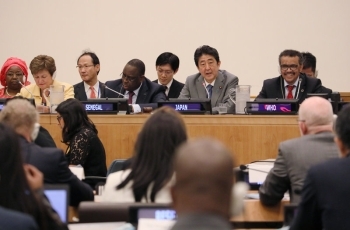 Photo: Cabinet Public Relations Office
Photo: Cabinet Public Relations Office
(3) Bilateral meetings etc.
(a) Japan-Israel Summit Meeting (September 18 (Monday))
Prime Minister Abe explained that he intends to continue to pursue cooperation in a broad range of fields including the economy, advanced technologies and cyberspace, and the two leaders confirmed that with the two countries celebrating the 65th anniversary of the establishment of diplomatic relations, they will promote further cooperation going forward. Furthermore, Prime Minister Abe explained Japan's position with regard to North Korea and obtained the understanding and support of H.E. Mr. Benjamin Netanyahu, Prime Minister of Israel. In addition, Prime Minister Abe expressed gratitude for Israel's cooperation with Japan's unique efforts for peace in the Middle East, including the "Corridor for Peace and Prosperity" initiative, and the two sides confirmed that the two countries will cooperate further in the future.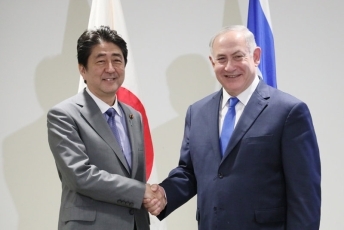 Photo: Cabinet Public Relations Office
Photo: Cabinet Public Relations Office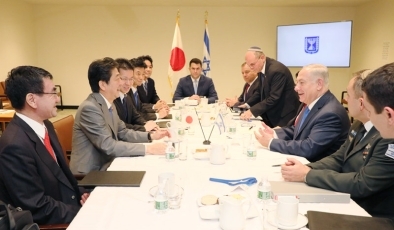 Photo: Cabinet Public Relations Office
Photo: Cabinet Public Relations Office
(b) Japan-Iran Summit Meeting (September 19 (Tuesday))
H.E. Dr. Hassan Rouhani, President of Iran, expressed his expectation over the recent advancement in Japan-Iran relations. Prime Minister Abe responded that he is supporting corporate activities with the aim of expanding the two countries' economic relationship, and intends to promote cooperation in a wide range of fields, such as healthcare, the environment, culture and tourism. With regard to the nuclear agreement, Prime Minister Abe explained that Japan supports the nuclear agreement, and hopes Iran will continue to comply with the agreement in the future. Prime Minister Abe expressed the view that it is important for all the relevant countries to comply with the nuclear agreement and its spirit, and President Rouhani replied that Iran intends to comply with the nuclear agreement. With regard to North Korea, Prime Minister Abe highly appreciated the unanimous adoption of the new UNSC resolution that includes significantly strict measures, and emphasized that the relevant UNSC resolutions will have an effect to its full potential only if they are fully implemented, and that he hopes Iran to do so. Prime Minister Abe stated that the abductions issue is a highest priority for his administration and he hopes to have President Rouhani's understanding and cooperation in resolving the issue promptly. In response, President Rouhani stated that Iran is opposed to nuclear war, the development of nuclear weapons, and intimidation that relies on nuclear weapons, and that Iran has delivered this message to North Korea as well.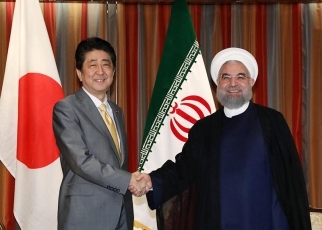 Photo: Cabinet Public Relations Office
Photo: Cabinet Public Relations Office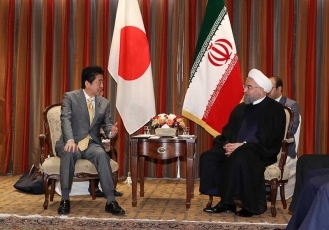 Photo: Cabinet Public Relations Office
Photo: Cabinet Public Relations Office
(c) Meeting with UN Secretary General Guterres (September 19 (Tuesday))
With regard to North Korea, Prime Minister Abe stated that it will be important for all member countries to fully implement the UNSC Resolution 2375, that in order to hold meaningful dialogue with North Korea it will be necessary for North Korea to demonstrate serious intent and action toward denuclearization to begin with, and that now is the very time when it will be important to intensify pressure in order to create a situation in which North Korea seeks dialogue. Furthermore, Prime Minister Abe explained that the abductions issue is a top priority issue for his administration, and he hopes for understanding and cooperation. The two sides confirmed that they will continue to work closely together.Furthermore, with regard to UN reform, Prime Minister Abe stated that he intends to support and cooperate with Secretary General Guterres' efforts to reform the UN, but UN reform will not be completed without UNSC reform, and he hopes to achieve visible progress during this UN General Assembly session. The two sides confirmed that they will continue to work closely on UN reform.
 Pool Photo
Pool Photo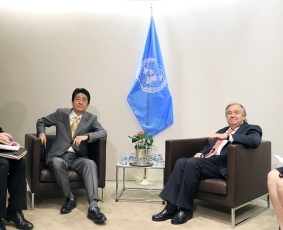 Pool Photo
Pool Photo
(d) Japan-Jordan Summit Meeting (September 19 (Tuesday))
Prime Minister Abe stated that he intends to further advance the bilateral relationship with Jordan, which Japan has traditionally enjoyed friendly relations with, in a broad range of fields including diplomacy, the economy and security. Prime Minister Abe also expressed gratitude and respect for Jordan's acceptance of Syrian refugees, along with conveying Japan's intention to continue to provide all possible support for Jordan's economic and social stability. The two leaders also exchanged views on regional affairs, including the Middle East peace process, and confirmed that they will continue to cooperate in order to promote the "Corridor for Peace and Prosperity" initiative.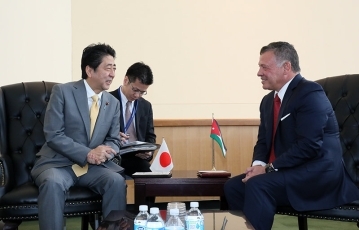 Photo: Cabinet Public Relations Office
Photo: Cabinet Public Relations Office
(e) Japan-France Summit Meeting (September 20 (Wednesday))
Prime Minister Abe emphasized that North Korea had once again launched a ballistic missile on September 15, which poses an unprecedented, grave and imminent threat to the security of the international community. Prime Minister Abe also highly appreciated the unanimous adoption of the UNSC resolution that includes significantly strict measures on North Korea, and emphasized that the relevant UNSC resolutions, including the new resolution, will have an effect to its full potential only if they are fully implemented by countries. With regard to this point, the two leaders also shared recognition on the importance of the role of China and Russia in dealing with the North Korea problem, and confirmed that Japan and France will cooperate closely in the international community, including in the UNSC. In addition, the two leaders shared the view that they will further pursue security and defense cooperation between Japan and France. They also exchanged views on regional situations such as the South China Sea, and shared the view that they will continue to work together closely in order to maintain the international order based on the rule of law. Furthermore, the two leaders shared the view that they will continue to cooperate closely in order to ensure the success of "Japonism 2018", a major event for demonstrating Japanese culture that will be held next year, mainly in Paris. The two leaders also confirmed that they will cooperate toward the early signing and entry into force of the Japan-EU Economic Partnership Agreement (EPA).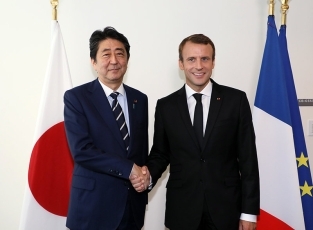 Photo: Cabinet Public Relations Office
Photo: Cabinet Public Relations Office
(f) Courtesy call from IOC President Bach (September 20 (Wednesday))
Prime Minister Abe and President Bach confirmed that they will continue to work closely together for the success of the 2020 Tokyo Olympic and Paralympic Games. President Bach expressed gratitude for the superb work of the individuals concerned and Japan's consistent support for the Olympics. Prime Minister Abe explained that the Tokyo Olympics are also a "Recovery Olympics," and from that perspective he is promoting "host town" initiatives for grassroots exchanges between Japanese municipalities and the countries and regions participating in the games from around the world, so that visitors from a large number of countries get to see the recovery from the earthquake. Prime Minister Abe also stated that he hopes to have the affected regions utilized for pre-training camps and other activities. President Bach explained that he will continue to support Japan's efforts.(g) Japan-Turkey Summit Meeting (September 20 (Wednesday))
Prime Minister Abe expressed that he is encouraged by H.E. Mr. Recep Tayyip Erdogan, President of Turkey, who is overcoming numerous difficulties engaged in the reform. Prime Minister Abe also stated that he hopes to further strengthen the relationship between the two countries as strategic partners. Furthermore, Prime Minister Abe explained the Japanese situation regarding North Korea and confirmed both sides' strong cooperation. With regard to bilateral relations, Prime Minister Abe stated that he hopes to collaborate more closely in order to build a multilayered and cooperative relationship for the two countries' strategic partnership. The two leaders confirmed that the Turkish-Japanese Science and Technology University will provide an important base for cooperation between the two countries for the future, and that they will continue to cooperate in order to open the university promptly. The two leaders also discussed ways to strengthen the bilateral relationship between the two countries in the economic field, including trade, investment and tourism, and shared the view on accelerating the negotiations on the Japan-Turkey EPA.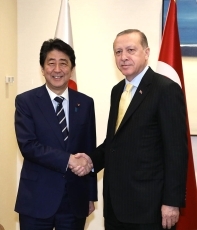 Photo: Cabinet Public Relations Office
Photo: Cabinet Public Relations Office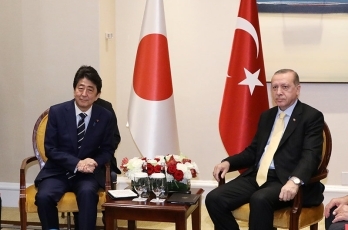 Photo: Cabinet Public Relations Office
Photo: Cabinet Public Relations Office
(h) Japan-Croatia Summit Meeting (September 21 (Thursday))
Prime Minister Abe explained that next year marks the 25th anniversary of the establishment of diplomatic relations between Japan and Croatia. He also expressed his desire to take advantage of this milestone year to strengthen not only bilateral cooperation but also cooperation in the international arena and in the context of the Japan-EU relationship. In addition, Prime Minister Abe pointed out that North Korea launched a ballistic missile which flew over Japan again on September 15, and conducted six nuclear tests, which poses an unprecedented, grave and imminent threat to the security of the international community. Prime Minister Abe also explained that the abductions issue is the most important issue for his administration, and he requested Croatia’s understanding and cooperation to resolve the issue promptly. Moreover, the two leaders shared the view that they will continue to cooperate to further advance the Japan-Croatia relationship.(i) Meeting with 72nd UN General Assembly President Lajčák (September 21 (Thursday))
Prime Minister Abe expressed the view that North Korea's ballistic missile launches and nuclear tests are a clear violation of the UNSC resolutions and a serious blow to the non-proliferation regime, and conveyed that he hopes to cooperate with President Lajčák in order to encourage Member States to fully implement the relevant UNSC resolutions. Prime Minister Abe also requested understanding and support for resolving the abductions issue. Furthermore, Prime Minister Abe expressed the expectation over General Assembly President Lajčák's leadership with regard to UNSC reform. The two sides shared the view that they will cooperate on the above-mentioned challenges as well as the large number of challenges facing the international community, including sustainable development. Photo: Cabinet Public Relations Office
Photo: Cabinet Public Relations Office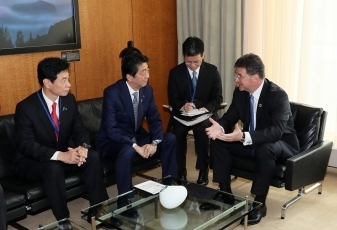 Photo: Cabinet Public Relations Office
Photo: Cabinet Public Relations Office
(j) Japan-U.S.-ROK Trilateral Summit Meeting (September 21 (Thursday))
Prime Minister Abe appreciated that he could meet the two leaders again, and explained that amid the unprecedented and real crisis the world is facing, he hopes that Japan, the United States and the ROK will once again discuss strategies for making North Korea abandon its nuclear program. Prime Minister Abe stated that he welcomes and supports the United States' new measure from the standpoint of exerting a new level of pressure. The three leaders shared the view that they will deepen collaboration under the unity of the three countries, such as by increasing efforts to encourage the international community, including China and Russia. Furthermore, they shared the recognition that it will be necessary to apply greater pressure in order to bring about a change in North Korea's policies. On that basis, they appreciated the unanimous adoption of the UNSC Resolution 2375 as an extremely important step, along with sharing the view that it will be important to ensure the resolution is fully implemented. In addition, the leaders of the three countries also discussed Japan-U.S.-ROK security and defense cooperation from the standpoint of protecting the safety and peace of the three countries' citizens, and shared the view that they advance their cooperation. Prime Minister Abe once again highly appreciated that President Trump expressed strong resolve with regard to the North Korea problem in his address, and that President Trump is repeatedly asserting his position that all options are on the table. Prime Minister Abe appealed for understanding and cooperation with promptly resolving the abductions issue, which President Trump mentioned in his address, for the first time as a U.S. President, and Prime Minister Abe confirmed that he will continue to work closely with President Trump and President Moon.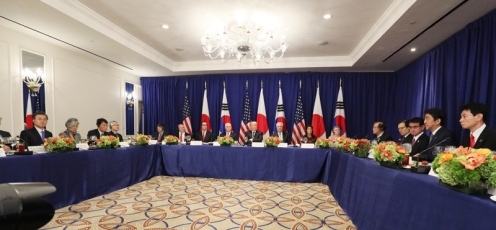 Photo: Cabinet Public Relations Office
Photo: Cabinet Public Relations Office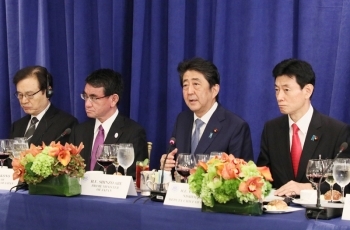 Photo: Cabinet Public Relations Office
Photo: Cabinet Public Relations Office
(k) Japan-U.S. Summit Meeting (September 21 (Thursday))
Prime Minister Abe expressed his gratitude to President Trump's mention of Ms. Megumi Yokota in his address to the UN General Assembly, indicating it was an extremely encouraging message for Ms. Yokota's parents and the families of other abduction victims. Prime Minister Abe expressed the view the key in dealing with the North Korea issue is to bring about change in North Korea's policies, and that dialogue for the sake of dialogue is meaningless. He emphasized that it would be important to exert greater pressure on North Korea, and the fact that he and President Trump have together been able to demonstrate their strong intent thus far will lead to a concerted response from the international community, and he hopes to further deepen discussions with President Trump. The two leaders discussed the situation concerning North Korea. They once again shared the view that a series of provocative actions including North Korea's ballistic missiles launch on August 29 as well as on September 15 and its nuclear test on September 3, poses an unprecedented, grave and imminent threat to the international community including Japan and the United States. They confirmed that the U.S. commitment to defend Japan through the full range of U.S. military capabilities, both nuclear and conventional weapons is unwavering, and Japan and the United States are together 100%. The two leaders welcomed the recent adoption of the UNSC resolution 2375. They affirmed the importance of continued cooperation between Japan and the United States, trilateral cooperation between Japan, the United States, and the Republic of Korea, as well as to urge relevant countries including China and Russia to secure the full implementation of the resolution and to further work on maximizing the pressure against North Korea. Furthermore, the two leaders shared the view that Japan and the United States will work together to urge regions where there are a large number of foreign workers from North Korea and those that continue to trade as before with North Korea to cut off the flow of capital to North Korea, and will urge countries that have "diplomatic" relationships with North Korea to review their relationships. Prime Minister Abe sought support and cooperation toward the early resolution of the abductions issue, and obtained the support of President Trump. The two leaders also discussed the economic matters, and confirmed that both sides will accelerate the coordination for the second round of the Japan-U.S. Economic Dialogue due to be held within this year. Furthermore, the two leaders shared the view that they will continue the coordination for President Trump's visit to Japan this year.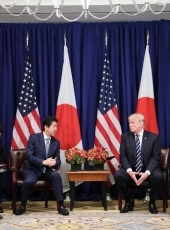 Photo: Cabinet Public Relations Office
Photo: Cabinet Public Relations Office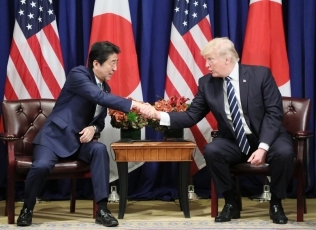 Photo: Cabinet Public Relations Office
Photo: Cabinet Public Relations Office
(4) Multilateral meetings etc.
(a) Meeting with the leaders of African countries that are UNSC members (September 18 (Monday))
Prime Minister Abe outlined the contributions that Japan is making to African peace and stability, along with explaining that North Korea's decisions to go ahead with nuclear tests and ballistic missile launches are an unprecedented, grave and imminent threat to the peace and safety of the international community. On that basis, Prime Minister Abe explained that it is necessary to exert a new and unprecedented level of pressure on North Korea, and emphasized the need to fully implement the relevant UNSC resolutions to ensure that no "loopholes" occur in the sanctions. Additionally, Prime Minister Abe stated that in order also for Japan and Africa to contribute more proactively to the peace and stability of the international community, UNSC reform is a pressing issue. In response, the African side leaders stated that North Korea's nuclear tests constitute a direct challenge to the international community, and that they support Japan's position. They also emphasized the importance of UNSC reform.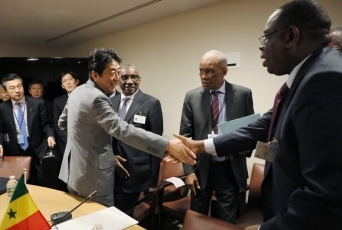 Photo: Cabinet Public Relations Office
Photo: Cabinet Public Relations Office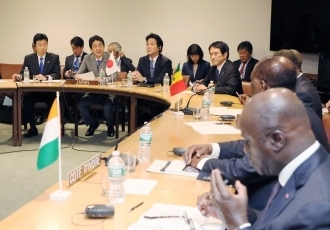 Photo: Cabinet Public Relations Office
Photo: Cabinet Public Relations Office
(b) Japan-Pacific Islands Leaders' Meeting (September 19 (Tuesday))
Prime Minister Abe held the fourth Japan-Pacific Islands Leaders' Meeting, and the participating countries expressed support for Japan's position with regard to North Korea, and affirmed that they will cooperate toward the full implementation of the UNSC resolutions. In addition, Japan and the Pacific island countries affirmed that they will cooperate on various challenges regarding maritime issues, sustainable development including climate change and disaster reduction, invigoration of people-to-people exchanges and international challenges such as UN Security Council reform in view of the 8th Pacific Islands Leaders Meeting (PALM8) that will be held in May 2018. The leaders and cabinet ministers from Pacific island countries, including the Hon. Tuilaepa Lupesoliai Sailele Malielegaoi, Prime Minister of the Independent State of Samoa, and H.E. Tommy E. Remengesau, Jr., President of the Republic of Palau attended the meeting.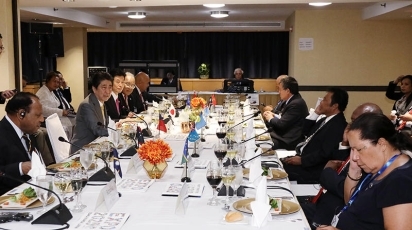 Photo: Cabinet Public Relations Office
Photo: Cabinet Public Relations Office
Photo: Cabinet Public Relations Office
(c) Announcement ceremony for the HeForShe IMPACT10×10×10 Gender Parity Report (September 20 (Wednesday))
As one of the Heads of State IMPACT Champions selected by UN Women, Prime Minister Abe attended the announcement ceremony for the HeForShe (a UN Women campaign calling on men and boys to contribute to promoting gender equality) IMPACT10×10×10 Parity Report. Along with explaining Japan's initiatives for realizing "A Society Where Women Shine" and the outcomes of those efforts, Prime Minister Abe introduced the "The World Assembly for Women: WAW! 2017," which is scheduled to be held in Tokyo in November, and called on HeForShe supporters to link up at the WAW! and work together to realize societies in which women shine worldwide.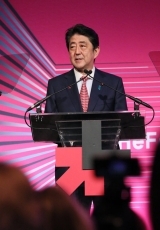 Photo: Cabinet Public Relations Office
Photo: Cabinet Public Relations Office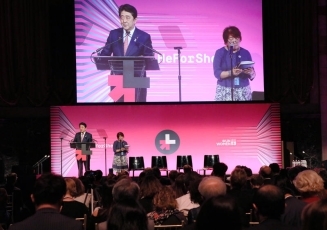 Photo: Cabinet Public Relations Office
Photo: Cabinet Public Relations Office
(5) Other
(a) Greeting at a food and tourism reception (September 18 (Monday))
Prime Minister Abe attended a reception whose theme was the appeal of Japanese regions and their foods. The reception was attended by over 200 people, among them various countries' VIPs, including the presidents of Comoros, Macedonia, Switzerland and Libya, as well as representatives from the food and tourism industries in Japan and the United States. In his greeting, Prime Minister Abe encouraged participants to "actually look at, eat and experience Japan."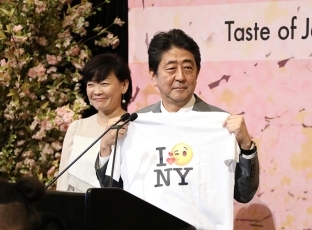 Photo: Cabinet Public Relations Office
Photo: Cabinet Public Relations Office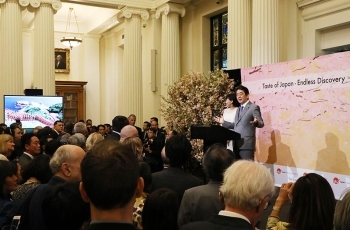 Photo: Cabinet Public Relations Office
Photo: Cabinet Public Relations Office
(b) Informal discussion with U.S. CEOs (September 19 (Tuesday))
Prime Minister Abe held an informal discussion with well-known businesspeople, investors and others from around the world. In the informal discussion, Prime Minister Abe talked about Abenomics' achievements thus far, the change in Japan's course that he hopes to instigate from here on, and the expectations that he holds for foreign investors, along with actively exchanging views with participants on measures that the Government of Japan should take to promote investment in Japan.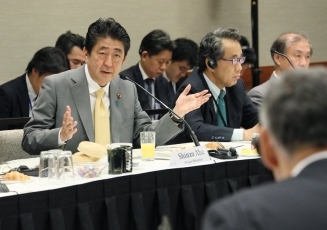 Photo: Cabinet Public Relations Office
Photo: Cabinet Public Relations Office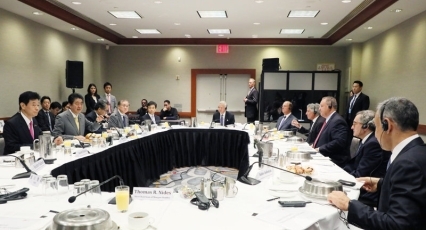 Photo: Cabinet Public Relations Office
Photo: Cabinet Public Relations Office
(c) Speech on Japan's economy at the NYSE (September 20 (Wednesday))
With the goal of increasing investment in Japan, Prime Minister Abe explained Japan's economic outlook and Abenomics' future developments directly to around 200 people, including the representatives of U.S. financial institutions that wield considerable influence domestically and overseas. Prime Minister Abe stated that he has continued to single-mindedly take action in order to reform the structure of the Japanese economy from the base up, as he mentioned in a speech he gave at the NYSE four years ago. Prime Minister Abe explained that from here on also, he will invest the entirety of his political resources to open up the future of Japan.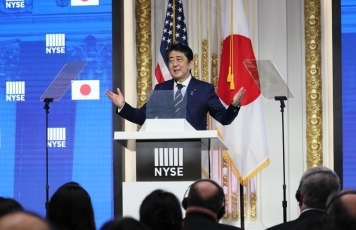 Photo: Cabinet Public Relations Office
Photo: Cabinet Public Relations Office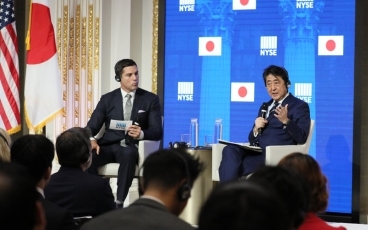 Photo: Cabinet Public Relations Office
Photo: Cabinet Public Relations Office
(d) Social gathering to encourage Japanese staff working at UN organizations (September 21 (Thursday))
Prime Minister Abe held an informal discussion with around 100 Japanese staff who work at various organizations such as the UN Secretariat, the UNDP and UNICEF. Prime Minister Abe mentioned that he focused on North Korea as the theme of his address to the UN at this year's UN General Assembly, and then explained that threat of the North Korea is grave and imminent for Japan, and it is important to fully implement the UN resolutions which all of those present contributed their valuable efforts to get adopted. Furthermore, Prime Minister Abe pointed out that the UN is tackling challenges facing the world such as sustainable development, immigration and refugees, and climate change, and stated that he hopes to build a better world through cooperating with the UN. Additionally, Prime Minister Abe stated that the contributions of the Japanese staff at the UN are heartening and he feels proud of them, and he offered words of encouragement by explaining that he is praying they will continue to play active roles.2 Schedule
September 18 (Monday)
Afternoon
Arrival in New YorkSide event on promoting UHC
Meeting with the leaders of African countries
Japan-Israel Summit Meeting
Food and culture reception
September 19 (Tuesday)
Morning
Informal discussion with U.S. CEOsJapan-Iran Summit Meeting
Afternoon
Meeting with UN Secretary General GuterresJapan-Jordan Summit Meeting
Lunch meeting hosted by UN Secretary General Guterres
Japan-Pacific Islands Leaders' Meeting
September 20 (Wednesday)
Morning
Speech on the Japanese economyAnnouncement ceremony for the HeForShe IMPACT10×10×10 Gender Parity Report
Japan-France Summit Meeting
Afternoon
Courtesy call by IOC President BachAddress to the UN
Japan-Turkey Summit Meeting
September 21 (Thursday)
Morning
Japan-Croatia Summit MeetingMeeting with 72nd UN General Assembly President Lajčák
Afternoon
Japan-U.S.-ROK Trilateral Summit MeetingJapan-U.S. Summit Meeting
Social Gathering to encourage Japanese staff working at UN organizations

